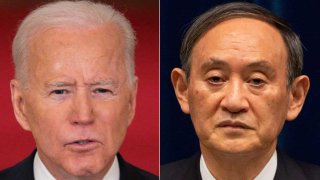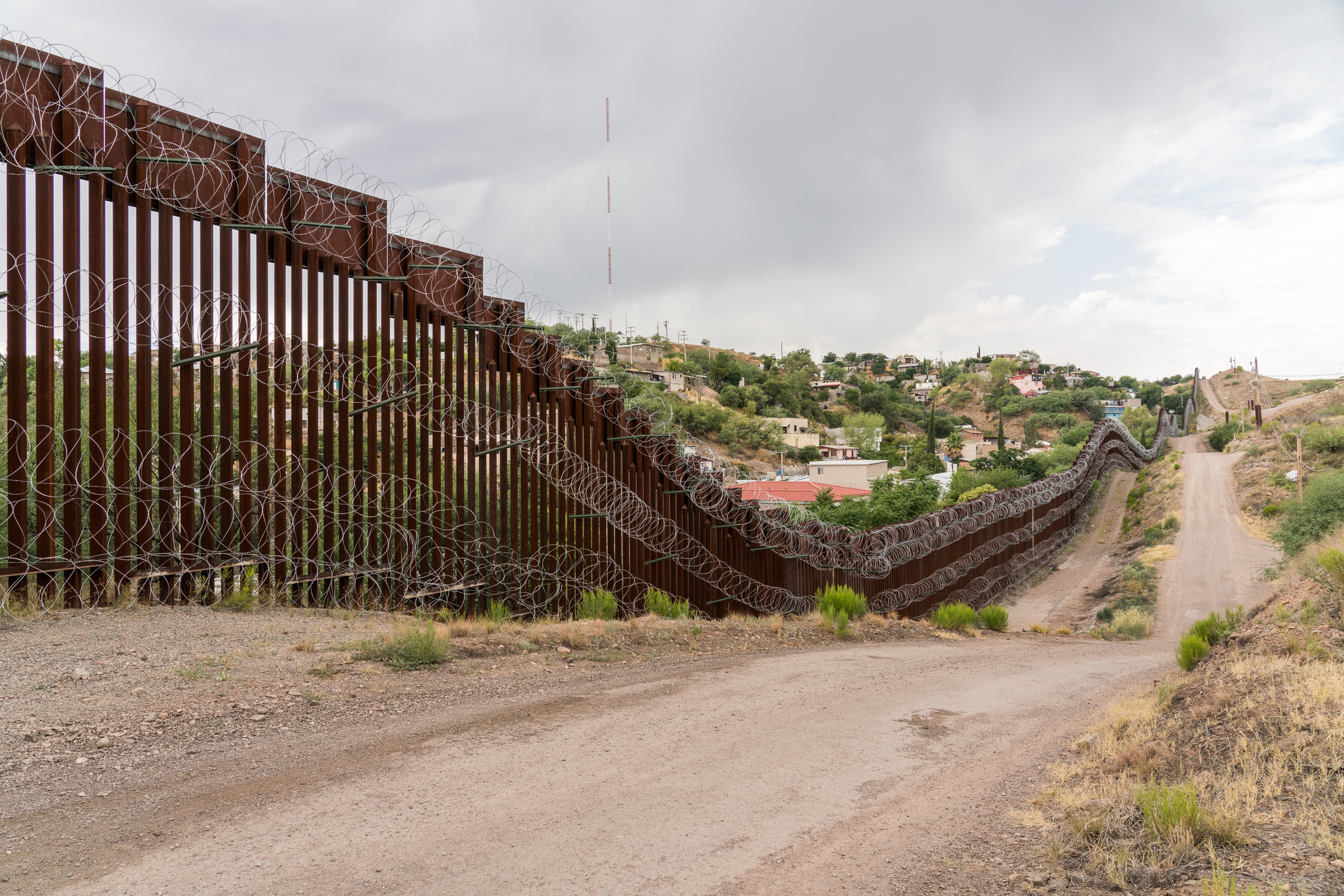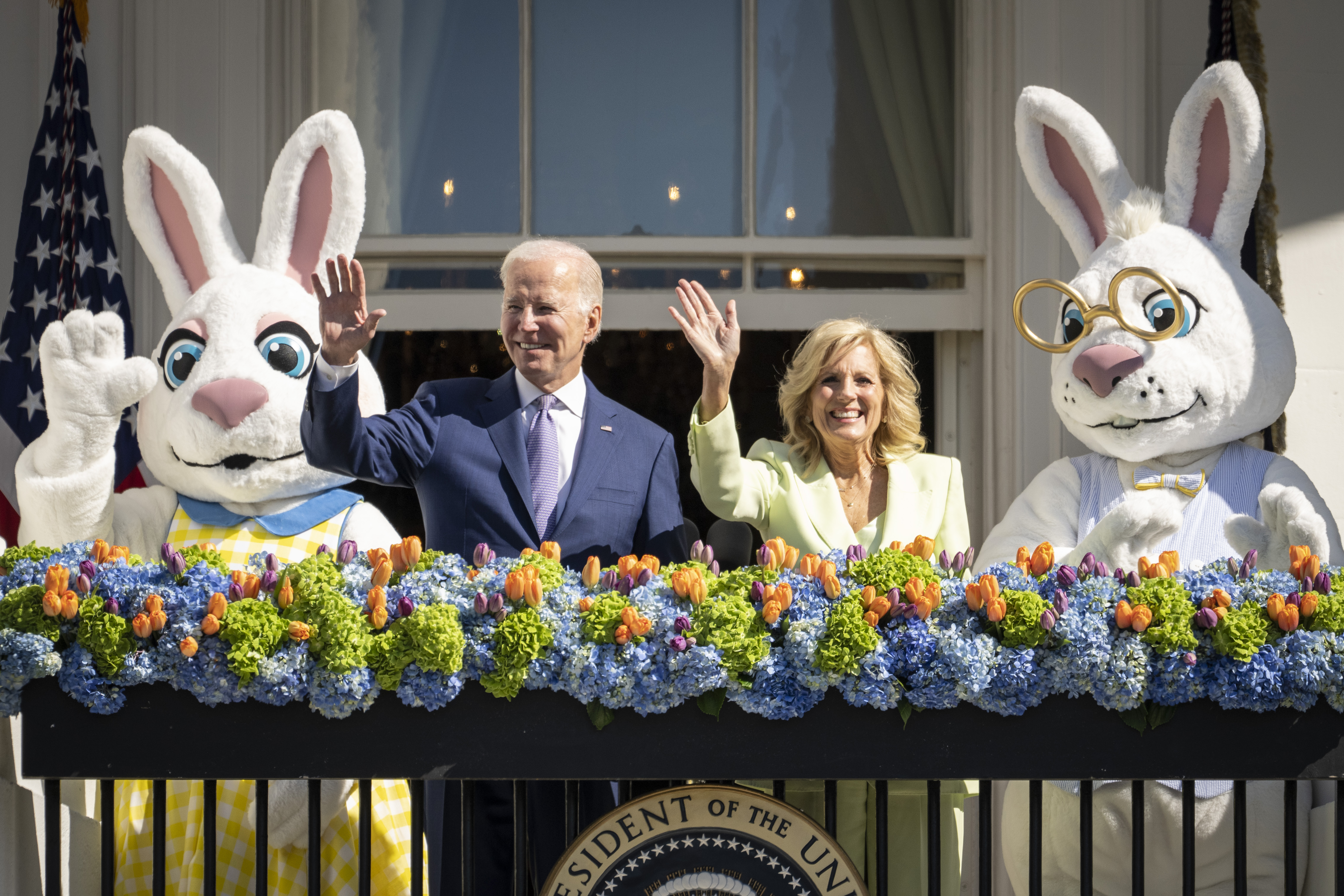
President Joe Biden and Japan Prime Minister Yoshihide Suga showcased the alliance between their two countries as well as their shared resolve in dealing with China as they met at the White House on Friday in Biden's first face-to-face talks with a foreign leader as president.
The talks featured unusually frank warnings from a Japanese leader against any effort by China to dominate the Indo-Pacific region by “force or coercion.” Suga said the visit was meant to “reaffirm the new and tight bond between us” as the U.S. and Japan deal with challenges in the region.
Suga and Biden, who wore masks for their meeting in a visit modified by precautions against the coronavirus, were seeking to challenge messaging from Chinese President Xi Jinping that America and democracies in general are on the decline following the political turmoil and international withdrawal that marked Donald Trump’s presidency.
In a news conference afterward in the Rose Garden, Suga made repeated references to the “severe security environment” in East Asia, where China under Xi is exerting its economic and military strength, including with military deployments meant to assert its disputed territorial claims in the region.
We're making it easier for you to find stories that matter with our new newsletter — The 4Front. Sign up here and get news that is important for you to your inbox.
Suga broke from past Japanese leaders on Friday by not veiling his comments about China, an important economic partner for Japan. The prime minister said he and Biden held “serious talks on China’s influence over the peace and prosperity of the Indo-Pacific. We oppose any attempt to change the status quo by force or coercion.”
Chinese Foreign Minister Wang Yi had warned his Japanese counterpart in a call ahead of Suga’s visit to see to it that China-Japan relations “do not get involved in the so-called confrontation between major countries,” according to a Chinese government readout.
The Biden administration calls managing U.S. policies toward China and the Indo-Pacific the primary challenge for the United States. That helped guide Biden's decision, announced this week, to pull U.S. troops out of Afghanistan and free the administration to focus more on East Asia.
The Biden Administration
President Joseph Robinette Biden Jr. and his administration
Biden stressed U.S. commitments to Japan's defense and said the alliance — the U.S. is Japan's only treaty ally — would “prove that democracies can still commit and win” and “deliver for our people.”
Biden turned to Suga at one point to note the recent victory of Japanese golfer Hideki Matsuyama in the Masters Tournament. The 29-year-old is the first Japanese player to win at Augusta National.
“You’ve got a Japanese boy coming over here, and guess what? He won the Masters,” Biden said.
Suga, a farmer’s son who rose to Japan’s highest political office after an early stint as a worker in a cardboard factory, succeeded Shinzo Abe as prime minister last September after long serving as his chief Cabinet secretary.
Suga expressed eagerness to meet with Biden early on despite global COVID-19 lockdowns. The pandemic changed the normal routine for a visit by a foreign leader, so Biden didn't host Suga for a meal, Psaki said. Earlier Friday, Suga placed a wreath at the Tomb of the Unknown Soldier at Arlington National Cemetery and visited with Vice President Kamala Harris. An honor guard greeted his arrival at the White House.
Suga began brief remarks to reporters before his session with Biden by expressing sympathy for the victims and families of the mass shooting at a FedEx facility in Indianapolis. “Innocent citizens must not be exposed to any such violence,” he said.
Shootings are far rarer in Japan, which has strict gun laws.
Suga also spoke out against a surge in attacks on Asians in the United States amid the coronavirus pandemic, and he and Biden pledged to fight such crimes.
The U.S. and Japanese governments have been working to strengthen technology supply chains independent of China during a shortage of semiconductors that's worrying businesses around the world. Both countries are expected in coming days to make deeper commitments to cutting climate-wrecking fossil fuel emissions, in line with Biden’s climate summit with 40 world leaders next week.
Japan long has moved cautiously on steps that might worsen relations with China, though Suga has been more outspoken. His administration pushed its comfort zone in a statement stressing “peace and stability” on the Taiwan Strait. That came during a visit last month by Secretary of State Tony Blinken and Defense Secretary Lloyd Austin, which was the Biden administration's highest-level face-to-face meeting at the time.
China, which claims the self-governed island of Taiwan as its territory, tested U.S. and Taiwanese resolve weeks into the Biden administration by sending fighter jets and bombers near Taiwan.
Japan's economy is intertwined with China's. That means even “with security concerns on the rise, Japan would have to take a two-pronged approach to balance competition and cooperation,” said Akio Takahara, a professor and China expert at the University of Tokyo.
Japan considers China’s growing military activity as well as its broad territorial claims to be a security threat. Japan is itself locked in a dispute with China over Beijing’s claim to the Japanese-controlled Senkaku Islands, called Diaoyu in China, in the East China Sea.
Elsewhere, Tokyo has watched with concern as China has built military installations on disputed territory it claims in the South China Sea.
U.S. ships regularly conduct so-called freedom of navigation operations, sailing into international waters that China claims as its own.
President Barack Obama was seen as cajoling China, in hopes of encouraging reforms. After initially praising Xi, Trump later took on China head-on and solo, with tariffs and insults, while building a golf-buddy relationship with Suga’s predecessor, Abe.
Biden has taken a different approach, reaching out to allies to try to form united fronts.
___
Knickmeyer reported from Oklahoma City and Yamaguchi from Tokyo. Associated Press writer Josh Boak contributed to this report from Washington.



